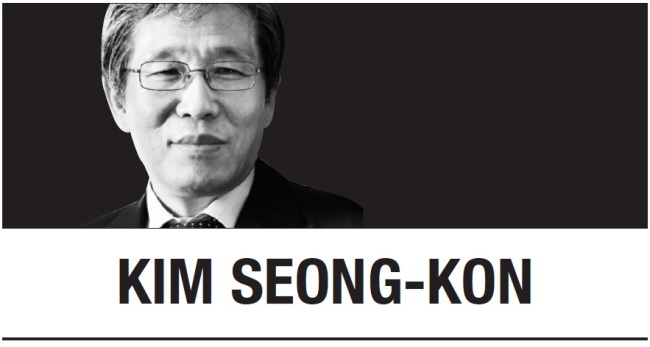[Kim Seong-kon] America’s 13 virtues and Korea’s 13
By Korea HeraldPublished : Nov. 28, 2017 - 17:42
 When they first appeared in the 18th century, Benjamin Franklin’s “Thirteen Virtues of Life” shaped the American mind and inspired the original American Dream. The 13 virtues were: temperance, silence, order, resolution, frugality, industry, sincerity, justice, moderation, cleanliness, tranquility, chastity, and humility. Originally, there were 12, but he added humility later, following the advice of his friend.
When they first appeared in the 18th century, Benjamin Franklin’s “Thirteen Virtues of Life” shaped the American mind and inspired the original American Dream. The 13 virtues were: temperance, silence, order, resolution, frugality, industry, sincerity, justice, moderation, cleanliness, tranquility, chastity, and humility. Originally, there were 12, but he added humility later, following the advice of his friend. Just as Franklin’s 13 virtues were needed in 18th-century America, I am of the opinion that Korea, too, needs 12 virtues of life to become a truly advanced country in the 21st century. Listening to me, Kim Sun-duk, editor-in-chief and executive managing director of the Dong-A Ilbo, suggested one more virtue: Honesty. I could not agree with her more, so I made a list of 13.
Generosity comes first. Oftentimes, we are too narrow-minded and seldom forgive and forget. An English maxim says, “Fools bite one another, but wise men agree together.” In order to be an advanced country, we need to be generous and open-minded. We should have the capacity and magnanimity to embrace even our political foes.
Furthermore, we need to be future-oriented, not past-oriented. We cannot change the past and what’s done cannot be undone. Why then should we cling to the past and dig out the dark pages of our history? The past is merely a mirror that reflects the present and the future. An English maxim enlightens us, “He is wise who looks ahead.” That means that it is foolish to focus on what is behind us. Yet we are foolishly preoccupied with the past, while other countries wisely move forward.
We should stop comparing ourselves to those who are better than us. Otherwise, we will be unhappy and miserable. Rene Etienble, a famous French scholar, once said, “Comparaison n’est pas raison,” which means, “Comparison is not good or reasonable.” There is also an English maxim, “A wise man cares not for what he cannot have.” Yet, we still crave for what we cannot have and become spiteful and resentful. As Jacques Attali says, however, “A society where people resent successful people does not have a bright future.”
We should not be self-righteous. If we firmly believe we are the only ones who embody “justice” and all others are unjust, we easily become dogmatic and obstinate. Then we will have only to look at the world in black and white, missing all the gorgeous colors and wider perspectives in between. And we will unwittingly become violent to others. In “The Name of the Rose,” Umberto Eco writes, “Beware of those who are willing to die for the truth. Those people can accompany others to death or even kill others.” An English maxim says, “A wise man changes his mind; a fool never does.”
We should learn to appreciate everything. Instead, however, we tend to take everything for granted and do not feel grateful at all. For example, few Koreans remember the names of the 21 countries that helped us during the Korean War by sending either combat troops or medical units. We have also completely forgotten that the US has played a crucial role in making us what we are today and unabashedly exhibit anti-American sentiment without reservation.
We also need a strong sense of shame and a code of honor. If we do, we will have admirable, decent leaders in our society. We should also learn to suppress our feelings and control our temper which often looks too emotional and horrendous in foreign eyes. Likewise, we should have self-esteem, not inferiority complexes which we often confuse with self-respect.
We should also display consistency, which will make us reliable and trustworthy in the international community. Unfortunately, we seriously lack consistency. We also should know our place. Some Koreans have delusions of grandeur and tend to think that Korea is the center of the world. Although Korea has become widely known to the word lately, we are still situated in the periphery.
We should have a global mind and global standards. We need to be alert to the radical and rapid changes taking place in the world. We also should discard the distorted sense of equality that is rampant in our society. For example, nearly all the major airports in other countries have a fast track for prestige-class passengers who pay more. But Incheon airport is a rare exception. If we think this sort of social equilibrium is the symbol of an egalitarian society, we are wrong.
We should overcome the chronic disease of bipolar extremism in our society and seek a third possibility instead. Neither the world nor our life is made of either/or constructions. We should always have a third choice. Life would be miserable if we only had two options.
Finally, we should be honest at all times. Unlike the people in countries based on business and trade, Koreans are very generous about dishonesty. For example, Koreans think of “cheating” as “cunning” or “cleverness.” But you should be honest if you want to be trusted. Otherwise, you lose credibility and integrity.
When we have these 13 virtues, Korea can emerge as a truly advanced nation.
By Kim Seong-kon
Kim Seong-kon is a professor emeritus of English at Seoul National University and president of the Literature Translation Institute of Korea. He can be reached at sukim@snu.ac.kr. -- Ed.
-
Articles by Korea Herald











![[Hello India] Hyundai Motor vows to boost 'clean mobility' in India](http://res.heraldm.com/phpwas/restmb_idxmake.php?idx=644&simg=/content/image/2024/04/25/20240425050672_0.jpg&u=)








